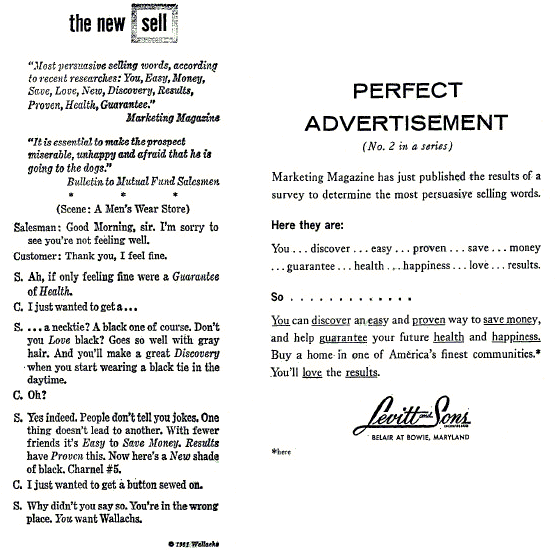October 11, 2006
Persuasive words: the early years
The list of the most persuasive (or powerful) words in the English language — variously attributed to researchers at University of California, Yale University, and Duke University — is actually a musty bit of lexical lore long predating the Internet. The earliest reference I've found in the newspaper databases is from way back in November 1963. And the source is not a surprising one: Bennett Cerf, a prolific vector of urban folklore (see, for instance, his numerous appearances on Snopes.com, the urban legend clearinghouse). Here's the item that appeared in Cerf's syndicated column, "Try and Stop Me":
A poll by a big advertising agency established the fact that in the eyes of a representative segment of the American public the ten most persuasive words in the English language — in the order named — are You, Easy, Money, Save, Love, New, Discovery, Results, Proven, and Guarantee.
[Vidette-Messenger (Valparaiso, Ind.), Nov. 1, 1963, p. 4; Lowell (Mass.) Sun, Nov. 4, 1963, p. 5; Northwest Arkansas Times, Nov. 7, 1963, p. 4; etc.]
So at the time, the poll from the (conveniently unnamed) "big advertising agency" only isolated 10 persuasive words. But it wouldn't take too long for the list to expand to 12, with the name of Yale and other prestigious-sounding institutions attached along the way.
In January 1970, another syndicated columnist named L. M. Boyd (something of a successor to Cerf) presented a list of 12, with the first attribution to Yale that I've found:
Language Man: The 12 most persuasive words in the English language are: you, money, save, new, results, health, easy, safety, love, discovery, proven and guarantee. Or such is the claim of researchers in the Yale psychology department. No salesman should forget this.
[Fresno (Calif.) Bee Republican, Jan. 20, 1970, p. 7; Yuma (Ariz.) Daily Sun, Jan. 20, 1970, p. B6; Burlington (N.C.) Daily Times-News, Jan. 20, 1970, p. 6A; etc.]
So this list is the same as Cerf's with the addition of health and safety. That's the version that circulated most frequently in the '70s, with various vague attributions lending a patina of authoritativeness. Here's an Associated Press item from January 1972, in which the list takes on significance by being quoted from the Canadian Consumer Magazine, which in turn credits an unnamed "research report":
The Canadian Consumer Magazine quotes a research report saying that the 12 most persuasive words in the English language are: You, money save, new, results, health, easy, safety, love, discovery, proven and guarantee. That three-letter word "sex", didn't even make the top 12.
[Gettysburg (Pa.) Times, Jan. 17, 1972, p. 9; Wisconsin Rapids Daily Tribune, Jan. 31, 1972, p. 12; etc.]
Bill Gold repeated the list in his Washington Post column "The District Line" in July 1978. Again, the list seems authoritative because it is quoted from a trade journal (in this case Association Trends), citing a nebulous "study by experts":
Trade and industry associations make up an important part of our area's economy, and they make a lot of news. So I try to keep an eye on them.
Many association executives read Association Trends , a weekly news magazine tailored to their interests.
In a recent issue, Trends reported that a study by experts had identified the 12 most persuasive words in the English language. They were listed as: "money, save, new, you, results, health, safety, easy, guarantee, discovery, proven and love."
The magazine suggests that if the research is valid, this headline ought to get almost everybody's attention: "If you love to save money safely, get Plorg - the proven health discovery for guaranteed, easy results."
I was pleased to find "love" included in the list, but surprised to learn that "sex" is no longer considered the eye-catcher it once was.
Trends also mentions that public relations people and advertising copy writers are wondering how the study managed to overlook "free," which along with "new," was long considered one of "the best-selling words in the language."
[Washington Post, July 27, 1978, p. 12]
The omission of free noted by Gold has been corrected in many versions, such as this one attributed to Duke University researchers, where safety has been removed to make way for free. Since save is already on the list, perhaps safety was seen as a tad redundant.
Forty-three years of this lingua-canard, with no end in sight...
[Update, 10/12/06: A little more digging turns up two examples of the "persuasive words" list predating Cerf's column by two years, both appearing in ads wryly commenting on survey results from a generic (and possibly fictitious?) "Marketing Magazine." The ad on the left appeared in the New York Times on Aug. 14, 1961 (p. 15), while the ad on the right appeared in the Washington Post on Oct. 11, 1961 (p. C2):

So make that forty-five years and counting...]
Posted by Benjamin Zimmer at October 11, 2006 11:50 PM